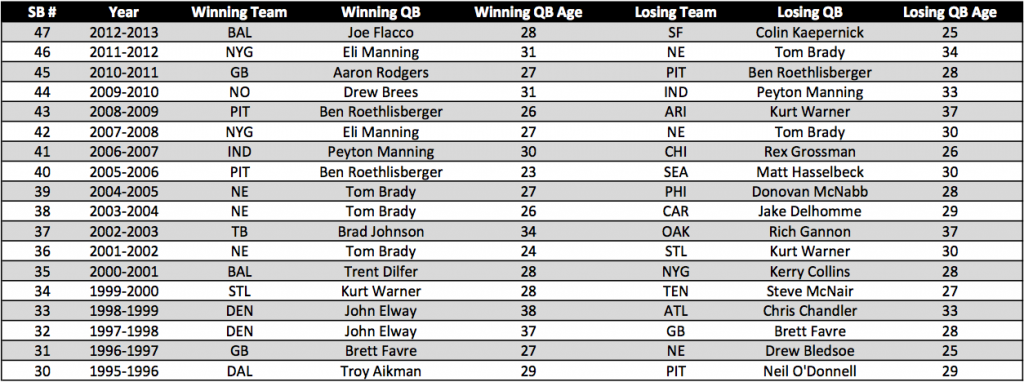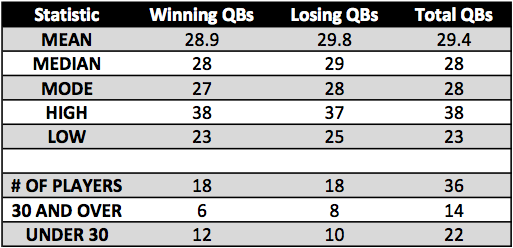
 In the shadow of the last two postseason losses, I’ve seen a number of Green Bay Packers fans itching for Ted Thompson to make some big roster moves. Their basic premise is that star quarterback Aaron Rodgers doesn’t have much time left to get to another Super Bowl. It’s either now or never if the team wants to make another serious run at it.
In the shadow of the last two postseason losses, I’ve seen a number of Green Bay Packers fans itching for Ted Thompson to make some big roster moves. Their basic premise is that star quarterback Aaron Rodgers doesn’t have much time left to get to another Super Bowl. It’s either now or never if the team wants to make another serious run at it.
Rodgers is, after all, turning 30 this December. By the time the season is over and the playoffs are underway, he’ll have reached that magic age in the NFL when a player’s value suddenly drops like a brand new car being driven off the dealer’s lot. Sure, he hasn’t shown any physical or mental signs of decline in his performance, but time flies when you’re chasing the Lombardi Trophy.
To be perfectly clear, I have been a big skeptic of this line of thinking. This skepticism has actually led me to do a little data mining. How many quarterbacks have won the Super Bowl after they’ve turned 30? How many have even played in a Super Bowl? Is it a foregone conclusion that Rodgers will be battling the odds in the coming years?
So I went all the way back to Super Bowl XXX and compiled the ages of the starting quarterbacks since that year. Just to note, I only went back 18 years for the purposes of time management and the idea that modern rules are helping with durability. Quarterbacks are being protected from physically damaging hits, so they should theoretically have a better chance of playing into their later years.
Here is the raw data I uncovered (click to enlarge):

After compiling all the data, I went through and calculated some simple statistics to help us measure and understand what we’re seeing:

Looking at the numbers, Aaron Rodgers has clearly surpassed the average age for quarterbacks appearing in a Super Bowl. Losing quarterbacks tend to be about a year older than winning ones, while the median age seems to hover around 28. About 60% of all quarterbacks starting in a Super Bowl during the past 18 years were under the age of 30.
That said, the oldest winning quarterback was 38 (John Elway), while the oldest losing quarterback was 37 (Kurt Warner). The range for winning quarterbacks is actually slightly larger on both ends than for losing quarterbacks.
If we look at some individual case studies, we can find some large success for star quarterbacks later in life. Though Tom Brady won his last Super Bowl at the age of 27, he played in his final two at the ages of 30 and 34. Eli Manning and Drew Brees both won a Super Bowl at the age of 31, and Peyton Manning appeared in his latest one when he was 33.
On the extreme end of the spectrum, John Elway won both of his Super Bowl titles when he was 37 and 38. Even Brett Favre was a field goal away from making it to a Super Bowl at the age of 40 with the Minnesota Vikings.
(For a rather trivial stat, Super Bowls 33 and 37 saw the oldest two quarterbacks in combined age at 71. And only four of the past 18 Super Bowls saw both starting quarterbacks over the age of 30.)
What does this mean for Aaron Rodgers? Well, nothing really. Past statistics have no bearing on future outcome when it comes to this type of number crunching. However, Rodgers will clearly be in the minority if he reaches another Super Bowl after he hits the age of 30, so there is legitimate concern for those people expressing as much.
On the flip side, there has been some clear success for quarterbacks beyond the age of 30, especially when they are of the “elite” variety. I’m sure most of us would place Rodgers in the group of Brady, Manning(s), Elway, and Brees. With this in mind, there’s plenty of confidence to believe that Rodgers can achieve similar success in his later years.
Whatever happens, though, the Packers can’t reach another Super Bowl without a quality supporting cast to go with Aaron Rodgers. And that is up to Ted Thompson, Mike McCarthy, and the rest of the front office and coaching staff.
——————Chad Toporski, a Wisconsin native and current Pittsburgh resident, is a writer for AllGreenBayPackers.com. You can follow Chad on twitter at @ChadToporski
Follow @ChadToporski——————

While age is a factor in performance, I wonder how much money is a factor in determining future winning. Win a Super Bowl, command a big contract and starve the remaining team of talent. Flacco has taken a ton of money for himself and may not leave enough to resign critical supporting cast. I think that the Patriots are an example of this. Other than Welker, Brady has been throwing to scrap for the last 5-6 years. After Rodgers takes his next cut, I wonder who will be around to catch the ball. Thank God we are a draft and develop organization.
You said exactly what I was thinking Razer. Maybe it’s more of a money issue. Most of the older star QB’s are probably eating up a lot of cap space. Because of that his team can’t sign(or resign) one or two other good or great players. And because the margin between losing and winning is often so thin(quite often just one or two plays a game), not have those one or two other playmakers is the difference in the result. Or not.
couple thoughts …. Brady has walker and two of the top four TEs two throw to. NE values possession WR/TEs, not the elite WR. The packs WRs are more than enough to win …. as long as the line doesn’t give up 50 sacks a year and MM uses the running attack when he’s getting 5 yards a carry to the right. Too many times, MM goes deep on 3rd and 1 or goes with pass, pass, pass, punt.
According to Pro Football Talk, AR’s deal is impending. Yes, he will be the highest paid player in the NFL for a while (a year or two at least). It is now going to be TT’s job to work his magic on the “Cap.” Some creative financing could help keep the surounding cast relatively unscathed.
The fact that CM3, Rogers, and Raji are all with the same agent adds an interesting element to the talks.
I found the analysis of QB’s in the SB very interesting. On the surface it says age is a factor in determining likelyhood of participating in the SB. This is football, the ultimate team sport. There are just too many other factors to be focus only on the Qb age benchmark.
That said let’s hope TT and Ball can come up with a plan to pay a guy who is grossly underpaid by NFL QB standards today and at the same time maintain or improve the team as a whole. In the current dilemma CM3 is also a must sign. Will there be enough “Cap” space avilable for Raji? It doesn’t look like it if you look only at the raw numbers. Maybe TT and Ball can come up with a Future Value of Money approach that wil satisfy both AR and CM3 and preserve some needed “Cap” space.
This is going to get interesting, very interesting.
The stat that needs to be presented is the average age of a starting QB over that same span. It could be that the average is actually the same (within the error presented by the sample size) as for SB QBs…I would not be surprised to learn that the average is actually YOUNGER.
The average age of ALL starting QB, I mean.
Players are a perishable commodity, and you never know when that next concussion or shoulder or knee injury will either end a career or rob a player of their greatest assets.
I don’t necessarily think that Rodgers is over the hill or past his prime (unlike me), but you never know when or who a player will come off that plateau and the notion of diminishing skills with age–in a healthy career–takes its toll.
In the modern NFL, a team with a single dominant unit (offense or defense) is at least a playoff team. While the Packers offense was less than dominant in 2012, they aren’t far off. Taking care of ARod and maximizing his effectiveness is the key to Packer success at this point…whether its through adding weapons in the passing game, the running game or solidifying the OL. I would argue that shoring up deficiencies on defense would accomplish the same ends.
I don’t believe the window is necessarily closing just yet, but a shrewd eye needs to be kept on a QB whose effectiveness is keyed by accuracy and mobility.
Can’t disagree that the marginal rate of return by improving the D would probably result in a higher team ROI. As much as we nit pick the O it was still a very good unit when compared to all other NFL teams.
Improving D peformance would generate a higher return. If you have to chose one or the other it should be the D. The only question is how to accomplish that goal in the constraints of the “Cap.”
Once again the fact that football is the ultimate team sport, it generates a lot of answers. I’m glad we’ve got TT to deal with them.
John Elway shows that if you put a great team around a good QB, he was after all passed his prime, you can win a SB. By making the moves that TT has so far he shows that he is trying to do that. As for the last two playoff losses, it looks to me like the Packers weren’t as prepared as their opponents at game time.
This idea of average conveys accurately what happens with a normal SB quarterback. I look at the list of QBs listed and think, “Aaron is not normal compared to this list.” Average can never predict what a single person can do, especially one far outside the idea of “an average starting Superbowl quarterback.”
Great work, Chad. I’m thinking of adding a standard deviation to the posts later.
Standard deviation of winning QBs is about 4 and for losing QBs is 3.6. This roughly means that about 75% of the winners will be between 25.8 and 33.8 years old. A little more than 90% will be between 21.8 and 37.8.
With that said…Rodgers is a QB outside of the remaining 25% or even 10%.
John Elway would not of won a single Superbowl if he did not have Terrel Davis.
I think improving the running game weather it is with the line or a new rb is the most important thing for getting win number 2 for Rodgers. It would also reduce the number of hits he takes if people didn’t think he was going to throw on every single third down.
How many of those QB’s on your list didn’t have a 1000 yard rusher on their team?
I hate to say this about a legendary QB, but Elway certainly wasn’t in the upper echelon of QBs during his super bowls in 97 and 98. Those offensive years were all Terrel Davis. Elway’s stats from 97 and 98, including playoff games, were solid but unspectacular. I guess my point is that AR is playing at a much higher level than Elway was during his back-to-back super bowls — playoff performance included.
2. That’s the minimum number of SB’s he will get back to. Write it down.
GBP 4 LIFE
The age of a specific group of QBs isn’t as important as the players and adjusted schemes to offset any diminished attributes/skills of the QB.
Elway proved this in both his SB seasons and Favre proved both sides of it with the Vikings.Year 1 the team played to the level that Favre needed and year 2 it played to Favres’ diminished skills.
Flacco as the most recent SB winning QB is now the highest paid and is pedestaled with a false skill set belief.
Flacco,unlike Rodgers,will play down to the loss of talent around him and becomes the most likely to never see a SB again.If it were not for a couple of teams beating themselves i;e Denver with 42 seconds to go…he’d still be waiting for a contract deal.
I appreciate your understanding that these statistics are meaningless. Samuel Clemens”there are lies, damn lies, and Statistics”. you can’t apply a stat to this: i.e. Elway. It is not about groups (stats) it is about individuals. This is posed by a certified 6 sigma Black Belt. We live in stats, but know which are real and which are bogus. Again, thanks for the reality check.
I always find that statistics are hard to swallow and impossible to digest. The only one I can remember is that if all the people who go to sleep in church were laid end to end they would be a lot more comfortable.
–Mrs. Robert A. Taft
Most great QB’s had to start from day one. They had to make their mistakes and then correct them. Rodgers had the advantage of sitting for 3 years. Living in the film room. So 1, he has less wear and tear on him then most 29 year old QB’s. And 2, He’s had the same coach, McCarthy, the whole time he’s been here. And for the most part other QB’s have had more than one. This is a great advantage, in that he knows exactly what McCarthy wants, and he doesn’t have to change they way he does things.
QB… wear and tear? These aren’t RB we’re talkin about. There’s very little wear snd tear on QBs. That’s why they can play til 37 or more.
No doubt being in the same system basically his whole career helped. Otherwise he might be Alex Smith right now.
You might want to tell that to David Carr, Matthew Stafford, or Mike Vick.
If the Packers don’t figure out how to protect Aaron Rodgers better than they have been pretty soon, you’ll have front row seats to what kind of wear and tear NFL QB’s actually can take.
Yes, RB’s get hit more, no question. But there is plenty of punishment to go around in the NFL.
Very little wear and tear? The difference between QB’s getting hit and RB’s getting hit, is the QB is usually just standing there waiting for a WR to get open. RB’s are moving through a designed hole with blocking and with a lot more pads on. They get hit more, of course, but the sacks on QB’s are usually much harder hits because they’re unexpected!
I understand all the fans want to win superbowls and feel that AR gives the Packers the best chance to do it.
I urge people to quit worrying about the trophy and really soak in the experience of the chase.
Win or lose, SB or not, relax and enjoy what we’re watching AR do on every down, every game, every season. It’s special.
Besides, the Packers could go on a crazy spending spree and end up with nothing to show for it anyways. Think “Eagles” or “Cowboys”, etc. Just enjoy the ride.
Chad – I went back to SB I and found that 47 QB’s or exactly 50% of all SB starting QB’s were age 30 or over. You went back only 18 c
Years because that period of time helps to make your point which is irrelevant. AR can play and with an improved OL and defense QB should not be a concern for the Packers for at least another 4-6 years. This needs OL, DL, and RB help. Keep the focus there and Rodgers will be re-signed. Future SBs will come with the right moves.